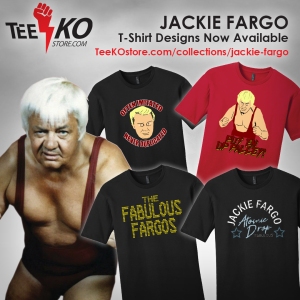St. Louis Post-Dispatch – July 14, 1991
By Jeff Gordon
By stressing muscle size and definition over old-fashioned grappling skills, the major promoter of professional wrestling may have encouraged rampant abuse of anabolic steroids and human growth hormones.
That trend was exposed recently in the drug trafficking trial of Dr. George Zahorian III, a suburban Harrisburg, Pa., urologist who was convicted of 12 counts of selling steroids, painkillers and Valium to a bodybuilder and several current and former World Wrestling Federation performers, including ”Rowdy” Roddy Piper. Zahorian also admitted selling steroids to WWF champion Hulk Hogan and WWF owner Vince McMahon, who is an avid bodybuilder.
”In the WWF, there used to be a joke,” former WWF wrestler and broadcaster Bruno Sammartino said in a phone interview from his Pittsburgh home. ”The joke was if you did not test positive for steroids, you were fired.” Sammartino, the federation’s champion for 15 years in the 1960s and 1970s, said he never used steroids to enhance his strength or appearance.
But he said all but a few modern wrestlers do. Before shows in Pennsylvania, Sammartino said, Zahorian ”would come in with two bags, one with his medical supplies and one with this stuff. The guys would get in a line to get the ‘goodies.’ The guys have been on this junk for years before now. This stuff has been going on for a long time.”
And the results can be disastrous. Former WWF star ”Superstar” Billy Graham, 48, testified that years of steroid abuse left him crippled with avascular necrosis, which caused joint deterioration. Graham has had one hip and one ankle replaced and will need similar surgery on his other hip and ankle. He can walk only with the aid of a walker.
Sammartino said many of the WWF’s current stars could suffer similarly someday. ”These guys are a combination of jackasses and walking time bombs,” he said. ”If they had any intelligence, they would look at Billy Graham and see mirrors of themselves down the road.”
The WWF responded to the crisis Friday by announcing that it was expanding its drug testing program to include steroids.
”The WWF has always stood for positive, family-oriented entertainment,” senior vice president Basil DeVito Jr. said in a statement. ”This innovative policy will insure that our athletes adhere to the highest standards in order to preserve their place as worthy role models throughout the world.”
But industry analyst Dave Meltzer, editor of the Wrestling Observer, remains skeptical. ”Whether the tests are fake or real, we’ll never know,” he said. ”When we see all of these guys lose 30 pounds, then we’ll know they are serious. If they continue to promote the best physiques as their top wrestlers, then we’ll know they are not serious — they will be rewarding cheating at the same time they’re testing.” That wrestlers have used steroids did not shock the sports entertainment world, given the similar revelations about college and pro football players and some Olympic Games participants.
Musclebound wrestler Jim Hellwig, billed as ”The Ultimate Warrior,” seemed to allude to his training habits when he told a television audience, ”I eat the chemical toxins other men fear.” This is why Hellwig was dubbed ”The Anabolic Warrior” by Meltzer.
But the Harrisburg drug trial pushed wrestling’s steroid abuse under a spotlight and endangered the WWF’s $125 million-a-year business, much of which is generated by merchandising wrestling toys to children. Wrestlers Dan Spivey, Rick Martel and Brian Blair – half of the ”Killer Bees” tag team — and Piper admitted buying steroids, painkillers and Valium from Zahorian and using the drugs.
Evidence submitted by the prosecution also showed that Mike Rotunda, who wrestles as ”IRS,” and WWF announcer Lord Alfred Hayes also bought drugs from Zahorian. Of WWF wrestlers linked to Zahorian, the immensely popular Hogan had the most to lose. Fortunately for him, Judge William W. Caldwell excused him from the trial, saying: ”The effect of quashing the subpoena is outweighed by the potential threat to the privacy interests of the wrestler.”
Hogan’s lawyer, Jerry McDevitt, released a statement blasting prosecutors for trying to ”aggrandize the trial by capitalizing on the good name and reputation of my client.”
”Hulk Hogan did nothing illegal and is not charged with any illegality,” the statement said. ”Hulk Hogan has no place in this trial and will not appear there. Instead the focal point of the trial will now return to its proper place, the alleged illegal activities of a physician.”
Sammartino found it odd that Hogan avoided the scrutiny of the trial. ”Here is a guy who is, to me, the phoniest guy in the history of the sport,” Sammartino said. ”Here is a guy who talks about saying your prayers – I doubt if he’s ever seen the inside of a church — and eating your vitamins. We all know what kind of vitamins he’s been on.”
As the news from the trial broke, Hogan canceled an interview with the Post-Dispatch which publicists for his new movie, ”Suburban Commando,” had arranged. The wrestlers were not prosecuted because steroids possession was not illegal while Zahorian was under investigation from 1988-90.
”The WWF feels victimized by the tactics and libelous statements of defense attorney William C. Costopoulos in utilizing the media in a bait-and-switch defense,” DeVito Jr. said in a statement. ”Dr. George T. Zahorian III is on trial, not the WWF or any WWF wrestlers. Neither the WWF or any of its wrestlers or associates is charged with any wrongdoing. We stand by our philosophy of wholesome family entertainment and the positive example we set for the youth of America.”
The other major wrestling promotion, Ted Turner’s World Class Wrestling, also has been accused of promoting steroids abuse.
The Miami Herald quoted a former WCW executive as saying more than 90 percent of its wrestlers used steroids. ”I’ve never heard of one guy who thinks what they were doing was wrong,” the former employee said. ”They’re like cocaine addicts.”
But Jim Herd, WCW executive vice president, told the Herald his organization does not have a steroid problem. ”We don’t condone steroid abuse, but we don’t condone drinking whiskey, either,” he said.
”You’re talking about individual grown-ups and intelligent human beings. We don’t test for steroids, but we would if we promoted amateur athletics.”



